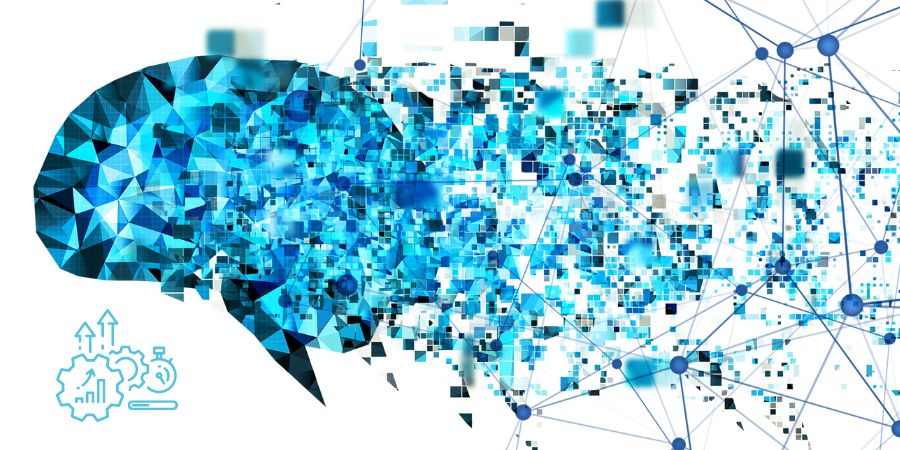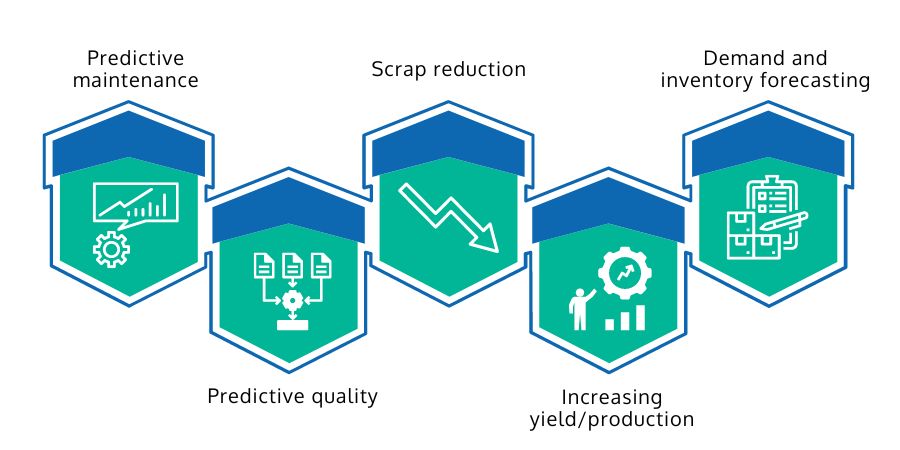
AI has brought disruptive innovation in every industry, and manufacturing has no exemption. AI emerged as a game changer for manufacturers with ultimate benefits such as greater efficiencies, lower costs, improved quality, and reduced downtime. From industry-led to small-scale manufacturers, high-value and cost-effective AI solutions are turning the tables.
By 2035, AI-powered technologies will enhance labor productivity by up to 40% across sixteen industries, including manufacturing. Specific to manufacturing, AI can bring about an additional $3.8 trillion in GVA to the manufacturing sector by 2035, representing a nearly 45% increase over current business practices. (Source)
Although leading enterprises exemplify the AI-led future, manufacturers still need help to deploy the technology at scale. With hidden intricacies in the domain, they experience major roadblocks. High revenue volatility, cost-effective business solutions, reduced production times, and demand for customized goods have made AI a top priority. AI not only transforms business models but also supports new operating paradigms supporting these models in the long run.
This article guides how AI in manufacturing is a pro formula to expand business globally at scale. This helps you understand why AI can add value to the manufacturing industry.
Why Adopt AI?
In manufacturing, AI implies employing data to make informed, actionable decisions more quickly and precisely than a human can. There are two areas where data makes sense - forecasting and comprehending anomalies or outliers.
Forecasting can add certain value to the manufacturing process; for instance, you can develop predictions if you have adequate historical data and an understanding of the decisions and processes around the data. AI can help you interpret why the same inputs on the same equipment produce different results or any particular manufacturing segment that interests you.
Manufacturing systems are holistic - one metric in one part of a process is related to another part of the same process. AI enables you to obtain what is happening at other locations if you're looking at one.

There are five areas where AI makes a significant impact in the manufacturing industry
- Predictive Maintenance: Using historical data from maintenance logs, you may predict how a machine behaves and reacts under a future payload. This can greatly decrease downtime.
- Predictive Quality: Anticipating and dismissing possible failures will give significant cost efficiencies.
- Scrap Reduction: You can reduce unnecessary waste(scrap) and improve product quality via the metrics to predict behavior across product requirements.
- Increasing Yield/Production: To know and understand when a machine or a process under defined circumstances won’t touch certain standards enables you to get what’s required to bring it back into standard mode while reducing quality passes.
- Demand and Inventory Forecasting: Understanding plant operations and the production data assist you in anticipating the demand and movement of critical parts that lead to huge inventory savings.

5 Ways AI Helps Manufacturing Industry
Direct Automation
AI and robotics are increasingly used in industrial manufacturing as they revolutionize mass production. Robots can do recurring tasks, design production models, increase competence, build automation solutions, eliminate human mistakes, and provide superior levels of quality assurance.
24x7 Production
In general, laborers are forced to work in three shifts for continuous production. In this case, robots can work 24*7 round the clock in a production unit. Businesses can expand their production capabilities to cater to the customers’ growing demand globally and at scale.
Safer Operational Environment
With multiple human-made errors occurring at manufacturing plants, implementing AI means a less error-prone approach while discharging human resources to perform dangerous and laborious tasks. As robots are replacing humans in their routine and hazardous tasks, it will lead to a decrease in unfortunate workplace accidents.
New Opportunities for Humans
As AI operates the manufacturing plant and automates mundane and ordinary human jobs, people can now focus on more complicated and innovative tasks. They can work on driving innovation and advancing their businesses while AI handles unskilled labor tasks.
Condensed Operating Costs
Deploying AI in manufacturing demands a considerable capital investment; the ROI is relatively high. Businesses can benefit from significantly lower operational costs as intelligent machines perform daily-based work activities.
Explore Manufacturing (Supply Chain Management) Opportunities with Batoi
“AI will perform manufacturing, quality control, shorten design time, reduce materials waste, improve production reuse, perform predictive maintenance, and more.” Andrew Ng, the co-founder of Google Brain
Manufacturers have adopted new technologies successfully. With AI adoption, they can make data-driven choices swiftly, streamline industrial processes, and reduce operational costs while improving customer service.
You can enhance your user experience by leveraging the potential of AI with Batoi and become a zero-incident enterprise:
- Quick installation with Low Code & No Code platform
- Extend team to external users
- Manage upstream and downstream activities
- Expert monitoring of your IT infrastructure
- Growing number of apps and integrations
- Achieve transparency and interoperability

 Batoi Corporate Office
Batoi Corporate Office